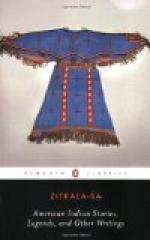From some of my playmates I heard that two paleface missionaries were in our village. They were from that class of white men who wore big hats and carried large hearts, they said. Running direct to my mother, I began to question her why these two strangers were among us. She told me, after I had teased much, that they had come to take away Indian boys and girls to the East. My mother did not seem to want me to talk about them. But in a day or two, I gleaned many wonderful stories from my playfellows concerning the strangers.
“Mother, my friend Judewin is going home with the missionaries. She is going to a more beautiful country than ours; the palefaces told her so!” I said wistfully, wishing in my heart that I too might go.
Mother sat in a chair, and I was hanging on her knee. Within the last two seasons my big brother Dawee had returned from a three years’ education in the East, and his coming back influenced my mother to take a farther step from her native way of living. First it was a change from the buffalo skin to the white man’s canvas that covered our wigwam. Now she had given up her wigwam of slender poles, to live, a foreigner, in a home of clumsy logs.
“Yes, my child, several others besides Judewin are going away with the palefaces. Your brother said the missionaries had inquired about his little sister,” she said, watching my face very closely.
My heart thumped so hard against my breast, I wondered if she could hear it.
“Did he tell them to take me, mother?” I asked, fearing lest Dawee had forbidden the palefaces to see me, and that my hope of going to the Wonderland would be entirely blighted.
With a sad, slow smile, she answered: “There! I knew you were wishing to go, because Judewin has filled your ears with the white man’s lies. Don’t believe a word they say! Their words are sweet, but, my child, their deeds are bitter. You will cry for me, but they will not even soothe you. Stay with me, my little one! Your brother Dawee says that going East, away from your mother, is too hard an experience for his baby sister.”
Thus my mother discouraged my curiosity about the lands beyond our eastern horizon; for it was not yet an ambition for Letters that was stirring me. But on the following day the missionaries did come to our very house. I spied them coming up the footpath leading to our cottage. A third man was with them, but he was not my brother Dawee. It was another, a young interpreter, a paleface who had a smattering of the Indian language. I was ready to run out to meet them, but I did not dare to displease my mother. With great glee, I jumped up and down on our ground floor. I begged my mother to open the door, that they would be sure to come to us. Alas! They came, they saw, and they conquered!
Judewin had told me of the great tree where grew red, red apples; and how we could reach out our hands and pick all the red apples we could eat. I had never seen apple trees. I had never tasted more than a dozen red apples in my life; and when I heard of the orchards of the East, I was eager to roam among them. The missionaries smiled into my eyes and patted my head. I wondered how mother could say such hard words against him.




